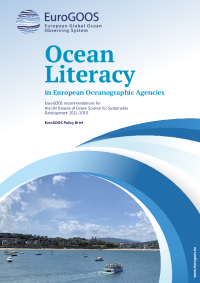Ocean Observing and Ocean Literacy – a Win-Win Deal
The success of the United Nations Decade of Ocean Science for Sustainable Development 2021-2030 will rely on sustained and fit-for-purpose ocean observing and derived oceanographic information and services. Ocean Literacy tools and approaches are needed to increase societal and policy awareness of the needs, challenges, and opportunities of the ocean observing enterprise. Furthermore, Ocean Literacy is important for achieving sustained operations and funding of the ocean observing systems, maintained predominantly by public funding.
The EuroGOOS Ocean Literacy network was established in 2019 to upscale the national efforts of the EuroGOOS members and contribute to broader Ocean Literacy efforts globally. Download our OceanObs’19 poster here. Since 2021, the network operates as EuroGOOS Working Group on Ocean Literacy.
Key Objectives
The EuroGOOS Ocean Literacy Working Group works to:
- Upscale the national efforts in Europe and contribute to broader Ocean Literacy efforts globally, providing visibility and recognition of the Ocean Literacy activities by the EuroGOOS members and community, at national, European, and global levels;
- Raise awareness about the ocean observing and forecasting needs, challenges, and opportunities through public and policy engagement;
- Contribute to international Ocean Literacy in link with the UN Ocean Decade and its Ocean Literacy Framework and realise the EuroGOOS Ocean Decade project “Scientists for Ocean Literacy“;
- Join efforts in collaborative projects or initiatives and help foster international partnerships;
- Deliver an improved Ocean Literacy resources platform, expanding the existing EuroGOOS Ocean Literacy resource library.
The EuroGOOS Ocean Literacy Working Group brings together experts from 25 organizations in 11 countries and 4 organizations with a pan-European or global remit.
List of Members
Co-chairs
- Yolanda Koulouri, Hellenic Centre for Marine Research (HCMR), Greece
- Angela Pomaro, National Research Council (CNR), Italy
- Dina Eparkhina, EuroGOOS Office – ex officio co-chair as coordinator of EuroGOOS UN Ocean Decade Action ‘Scientists for Ocean Literacy’
Members
Pan-European/International
- EuroGOOS UN Ocean Decade Action ‘Scientists for Ocean Literacy’ – Dina Eparkhina – Action Coordinator
- Joint Centre for Oceanography and Marine Meteorology in situ Observations Programmes Support (OceanOPS) / Ocean Observers Working Group – Emanuela Rusciano
- Euro-Argo ERIC / Ocean Observers Working Group – Claire Gourcuff
- Mercator Ocean International – Gratianne Quade
Belgium
- Royal Belgian Institute of Natural Sciences (RBINS), Belgium – Kelle Moreau
Croatia
- Institute of Oceanography & Fisheries (IZOR), Croatia – Daria Ezgeta Balic
Greece
- Hellenic Centre for Marine Research (HCMR), Greece – Panayota (Yolanda) Koulouri – Working Group Co-Chair
France
- French Research Institute for Exploitation of the Sea (Ifremer) – Lucie Cocquempot
- Sailing Hirondelle – Louise Ras
Ireland
- Irish Ocean Literacy Network, Ireland – Noirin Burke
- Marine Institute, Ireland – Rachael Brown
- Camden Education Trust, on behalf of Marine Institute, Ireland (Explorers Education programme) – Cushla Dromgool-Regan
Italy
- National Research Council (CNR), Italy – Angela Pomaro – Working Group Co-Chair
- Institute for Environmental Protection and Research (ISPRA), Italy – Marta Mancazeichen, Marina Amori
- National Institute of Oceanography and Applied Geophysics (OGS), Italy – Donata Canu and Elisa Banchi
- National Institute of Geophysics and Volcanology (INGV), Italy – Marina Locritani
Norway
- Norwegian Institute for Water Research (NIVA), Norway – Louise Valestrand, Kai Sørensen, and Andrew King
Portugal
- +ATLANTIC CoLAB, Portugal – Tiago Garcia
Spain
- AZTI Tecnalia, Spain – Maria Calvo Uyarra
- Institute of Oceanography (IEO), Spain – Mari Carmen García, Pablo Lozano
- Balearic Islands Coastal Ocean Observing and Forecasting System (SOCIB), Spain – Clara Ferragut
Sweden
- Swedish Institute for the Marine Environment – Kajsa Tönnesson
UK
- Met Office, United Kingdom – Ana Aguiar
- National Oceanography Centre (NOC), UK – Alice Kloker
Terms of Reference
|
EuroGOOS WG OL ToR September 2021 |
661.07 KB |

















































